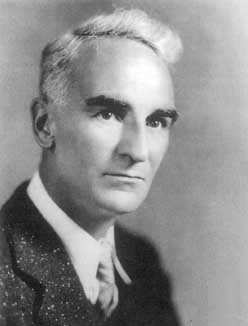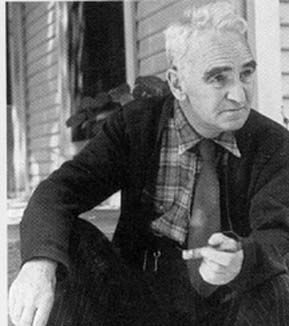

Eric Temple Bell
|
Visiting Professor (VP), Two Months: Fall 1942 Ph.D. 1912, Mathematics, Columbia University [Ph.D. Advisors: F. N. Cole & Cassius J. Keyser] M.A. 1908, Mathematics, University of Washington B.A. 1907, Mathematics, Stanford University |
- Mathematics Genealogy Project Entry
- The MacTutor History of Mathematics archive - Full Biography
- Complete Dictionary of Scientific Biography - Entry
- Some Famous Books by E. T. Bell:
- 1937, Men of Mathematics
- 1940, The Development of Mathematics
- 1951, Mathematics: Queen and Servant of Science
- Bell wrote the article "One Golden Age, Mathematics Since 1801"
in the University Review, Vol. IX, Winter 1942, No. 2, pp. 82-86, while he was in residence at KCU.
[Note: In 1944 the University Review was renamed the "University of Kansas City Review", and in 1971 became "New Letters".]
Bell also wrote for the University Review "A Clue Through the History of Mathematical Thought" in Vol. II, Spring 1936, No. 3, pp. 171-174, "Everything is Water: The Birth of Mathematics" in Vol. XI, Fall 1944, No. 1, pp. 35-41, and finally "An Un-Platonic Dialogue" in Vol. XI, Summer 1945, No. 4, pp. 241-246. - Excerpts about Eric T. Bell From: A Place of Light, The Story of a University Presidency, by Clarence R. Decker and Mary Bell Decker, 1954:
p. 190: If the V.P. [Visiting Professor] came for a semester or a year, he taught in the regular schedule, offering courses in the day and repeating them in the evening for townspeople and part-time students. If he came for a month, he gave an organized course of twenty lectures in the daytime on a subject mutually agreed upon. An examination closed the course and two credit hours were allowed. In the evening a telescoped version of the same course was given in eight sessions - no examination, but a paper was required from credit students. The lectures were carefully outlined and mimeographed in advance and, together with a bibliography and recommended readings, were given to the student at the time he enrolled. Ample time was reserved for discussion.
pp. 198-199: Eric T. Bell, author of many scientific works, pseudonymous writer of mystery tales, and professor of mathematics at the California Institute of Technology, was also a [Fall] 1942 V.P. The announced subject of his course was "The Influence of Mathematics on Philosophy", but many who followed the series of lectures felt it should have been "The Influence of Eric T. Bell in Debunking All Philosophy and Science".
When he had been with us a week, I wrote in my Journal: "We have just finished an evening with Eric Bell, T. V. Smith and Larry Kimpton - had steak dinner at the Savoy grill, then back home for talk. What I feared might be a dialectic slaughter proved an unmarred love feast. Bell is a sardonic iconoclast, hating all bunkum, gunning for all philosophers. It was Bell versus Smith in the ring. T. V., the super-diplomat, held his own, even convinced Bell they say eye to eye. Poor old Plato - Bell's pet peeve - came in for an awful drubbing. Bell calls him an old frump, a fuddy-duddy. He delights in destroying what he calls this archaic 'Plato worship'. T. V., with soft, easy charm, said, 'Yes, but -.' Deck, Larry and I made a flattering audience.
"Scottish- born, Eric Bell speaks with authority in the field of mathematics. He moves with easy familiarity among the philosophers, unawed, unimpressed, talking delight in shattering the false gods people have drawn from them. His lectures are masterpieces - clean-cut, no furry edges, easy to follow if one can sustain their unembroidered logic. For the select few who can, they are a unique experience with a philosophical mathematician." - Excerpt From: The Search for E. T. Bell, also known as John Taine, by Constance Reid, 1993:
p. 311: "That fall [1942] Bell accepted an invitation to spend two months at the University of Kansas City (now the University of Missouri at Kansas City). There he met a Mrs. Leoda Marie Stout, a handsome longtime divorcee, thirty-seven years old, who was giving up her successful wholesale cosmetics business because of ill health. Not long after their meeting, Mrs. Stout and her seventeen-year-old daughter, Rosemary, moved to California [where Bell taught at CalTech.]"